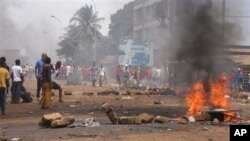Guinea's government says it deployed extra soldiers and police to the streets of the capital, Conakry, Friday, as youth in several neighborhoods set up makeshift barriers, vandalized cars and attacked private businesses. The unrest comes the day after an opposition protest during which the government says one person was killed and at least ten were injured. The opposition puts the death toll at four and says dozens were injured. The main opposition parties accuse the government of trying to rig upcoming elections, and say they will not take part in the polls scheduled for June 30.
Opposition protestors once again clashed with security forces in Conakry Thursday.
The protests, and the subsequent violence, have become a weekly event since the government announced the new poll date in mid-April.
Monday was the last day for candidates to sign up for legislative elections. Several key opposition parties did not put forward any candidates, saying to put their names on the list would have validated the poll date.
Moctar Diallo is a former government minister and leader of a main opposition coalition.
He says that the opposition will not participate in what he says will be a fraudulent election on June 30. And, he says, you cannot hold proper elections to elect the National Assembly without the participation of the opposition. He says the opposition will continue to protest peacefully within the law, and to demand that the government find reason and resume negotiations.
Legislative elections were originally supposed to take place in Guinea by June 2011. They are seen as the final step in a transition to democratic rule after the December 2008 military coup that followed the death of authoritarian President Lansana Conte.
But the vote has been pushed back repeatedly due to disagreements between the ruling party and opposition leaders over the composition of the electoral commission and which company will handle the technical side of voter registration and vote counting.
Mathias Hounkpe is the Guinea country officer for the pro-democracy group Open Society Initiative for West Africa.
"Basically, when you look at what is going on in Guinea today, the president and the government are the only one legitimate group, I mean forces, running the country and this is not good for accountability and for good governance and so on," Hounkpe said.
Hounkpe said that the decision of the opposition parties not to sign up for the poll could backfire.
"What they want is for the government to cancel its decree calling for elections on June 30th, before they sit down and discuss. What they are saying is, if we are not part of the elections, the elections are not going to be held… But when you boycott elections like that, if the elections are held on June 30th, they will not be represented. And that will hurt them," Hounkpe said.
Hounkpe said the opposition should instead focus on how they can monitor the polling process once it starts.
The government says it is open to negotiating with the opposition but that it plans to move forward with elections on June 30.
Efforts are ongoing in Guinea to organize internationally-mediated talks between the government and the opposition.




